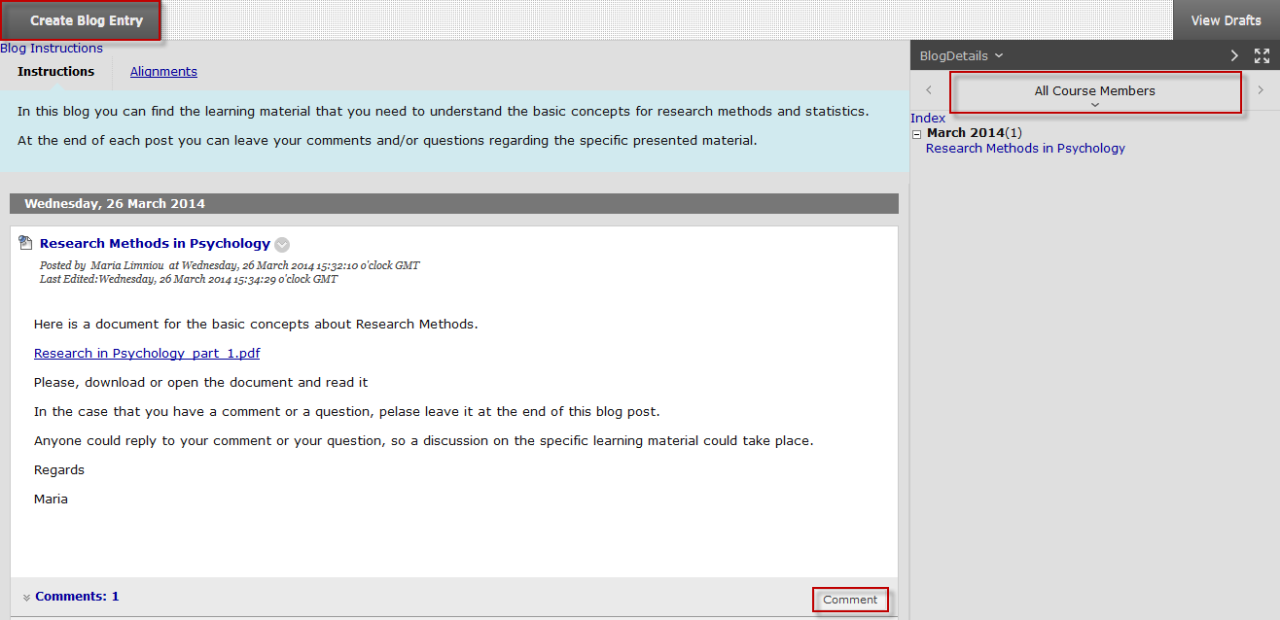Blogging (the processes of creating and maintaining a blog) has become popular as a form of personal communication and it supports the two-way communication between the authors of blogs and readers and also communication among readers (web 2.0 technologies/social media).
Generally, a blog is a Web site, where authors make regular, quickly and easily self-publish entries (posts) on a topic or a range of topics. Text, artwork, videos, links to other blogs or Web sites, and a whole array of other contents may include in a personal, a professional or a subject-based focus blog. Through posts the author’s blog may present his/her view on a topic, and a process of reflection, commentary, discovery, consultancy takes place. The posts appear in reverse chronological order and can include archived entries. Readers can subscribe to a blog in order to pick up the latest information, the comments of the day, and/or the new entries.
Note: There is a difference between website and blog, although the latest belongs to the general category of website. A web-editor adds web pages increasing the content and changing the structure of the website, but the order of pages are related to the website structure and not chronological publication. In blogs, the posts have their own static page and URL, but the later posts are presented in reverse-chronological order. Also, blogs have specific characteristics compared with websites such as short text posts (mainly 300-1000 words), follower widgets and comments.
The main types of blog activities or combination of them that can be integrated into courses are:
- class management activities, where teachers inform learning requirements, post handouts, notices, assignments and a discussion board (questions and answers);
- collaborative activities, where teachers and students work online for further developing writing, presentation or other skills. Teachers provide instructions to students who would be involved in a peer review. Students can also participate in cooperative/collaborative learning activities through comments and sharing ideas and views;
- discussions, where students and teachers can participate in an asynchronous communication outside of the lecture time. Students have time to react and reflect on others views, while other professionals can be involved in the process of exchanging view and supporting a network relevant to the topics.
- e-portfolios, where students organise and present to their works. Students are motivated to produce better writing and presentation, while their teachers and peers advice each other for improving their work, writing skills, presentation skills and structure.
Overall, blogs are useful where teachers want learners to write reflectively and in order to develop their writing skills. They can also be assessed in Blackboard, which support its own blog tool. In a collaborative blog everyone enrolled onto that blackboard course/module has access to. The blog tool in Blackboard is found in the Course Tool expansion. There are two options to set up 1. an individual to all students blog or 2. a course blog. Also, teachers need to fill out the online form with the name of the Blog, whether they wish to assess it and/or allow students to peer review each posts.
Note: The tool “Journal” is similar to blog one, but it gives students an online space for their own writing privately between the student and the teachers.
By clicking on the
- “Create Blog Entry” learners/teachers can start a new post;
- “Comment” button, they can leave a comment below the main post and
- “All Course Members”, they can see all the entries of the course/module members.
There are freely available blog platforms such as Edublogs, Blogger and WordPress, after signing up with that service, a publicly developed on the free blog platforms one which most of the millions of blogs are in the “blogoshere”. WordPress is one of the popular blogging sites and it does not take long students to set up their own blog.

Blogs in Education by Maria Limniou is licensed under a Creative Commons Attribution-NonCommercial-ShareAlike 3.0 Unported License.

